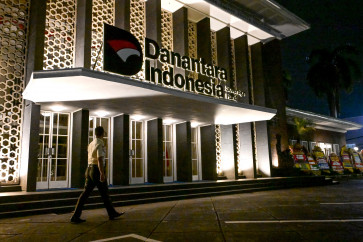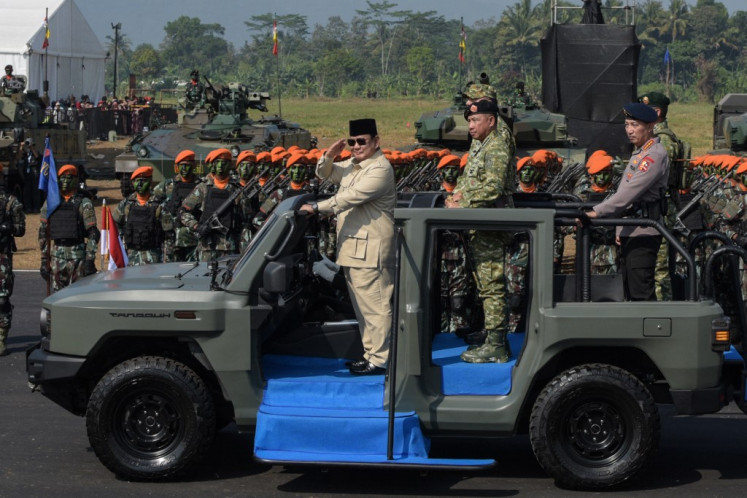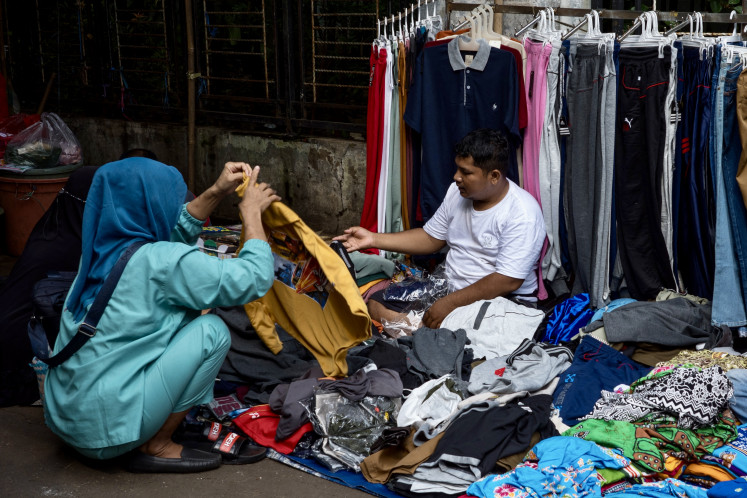Popular Reads
Top Results
Can't find what you're looking for?
View all search resultsPopular Reads
Top Results
Can't find what you're looking for?
View all search resultsTax bills killing drive to find new reserves in Indonesia
Exploration is the key to future oil and gas production
Change text size
Gift Premium Articles
to Anyone
E
xploration is the key to future oil and gas production. Successful exploration starts with proper data acquisition and geological evaluation of the whole block, followed by the drilling of a few wells, hopefully with at least one discovery.
In Indonesia, it takes about 10 to 15 years from the initial exploration to the first production. Historically, the chance for exploration success is about seven to one.
Typically in Indonesia, oil and gas contractors spend a minimum of US$5 million (for an onshore block) to $30 million (for a shallow water block) during the whole six years of the exploration phase. All exploration risks and costs incurred are solely borne by the contractors, to be reimbursed only when production starts.
The Energy and Mineral Resources Ministry has established the National Exploration Committee. One of the non-technical problems that readily challenged this committee is the case of the land and building tax (LBT) on the concession areas of companies still in the exploration stage.
For years, under the production sharing contract (PSC) terms, the contractors liable for income taxes, either personal or corporate income tax, included therein the dividend tax. Other taxes such as value added tax on purchased or imported goods used to conduct petroleum operations is paid on behalf of government. Since the government assumes and discharges all the taxes mentioned above and the retributions imposed, contractors will get reimbursement against production.
In December 2010, Government Regulation No. 79/2010 was enacted. It regulates recoverable operating costs and income tax treatments in upstream oil and gas. The new regulation becomes the framework of the next generation of PSC terms and conditions. After Government Regulation No. 79/2010 the government will no longer assume and discharge any taxes outside individual and corporate income taxes.
This change has an impact on the overbooking mechanism of the LBT in the blocks awarded from the year 2011 onwards. Nonetheless, no explanation regarding the LBT and its magnitude was prepared by the tax office.
As a consequence, the oil and gas industry was shocked when LBT assessments were given for exploration blocks in the middle of 2013. For example, a company with an offshore working area of about 8,000 square kilometers was taxed $26 million, or equivalent to Rp 316 billion, for the 2012 to 2013 financial year, which breaks down to $25.82 million for the surface tax component and $0.180 million for the subsurface tax component. The LBT was imposed on the whole working area instead of just the utilized parts, even though the company, as contractors, never owns the offshore area (the owner remains the government and the companies act only as the contractors).
This extraordinary amount is quite irrational as it far exceeded the total cost for petroleum exploration operations for the whole six years of the exploration phase, which for that block amounted to about $18 million. With such a huge amount, it is unlikely that the company, or in this case any oil company, will be able to maintain its economic threshold, thereby increasing the exploration risk of their specific block.
After several discussions, the Upstream Oil and Gas Regulatory Special Task Force (SKKMigas), the Directorate General of Oil and Gas (Migas) and contractors and the Directorate General of Taxation (DGT) indicated potential errors in the calculation of the Tax Object Notification Letter (Surat Pemberitahuan Obyek Pajak ' SPOP), which arguably led to a miscalculation of the LBT surface component and hence resulted in such an extraordinary figure. A consensus was then reached to revise and resubmit the SPOP.
As follow up, the DGT issued Circular Letter (SE DJP 46 Tahun 2013), which provides guidance in filling out the SPOP. With this specific guidance, contractors revised and resubmitted the SPOP through SKKMigas. In response, the DGT Office originally planned to issue the revised Notification of Tax Due (Surat Pemberitahuan Pajak Terhutang ' SPPT), paying special attention to the surface component.
Nonetheless, the resolution as promised by the DGT was not implemented. After contractors resubmitted the SPOP following the Circular Letter, the DGT never issued the revised SPPT and against instructions from SE46 no change was made to the very large amounts of the imposed LBT.
As there was no certainty on the resolution, all affected contractors filed tax objections and the DGT office responded by issuing rejection letters in the fourth quarter of 2014. Having no other alternative left, contractors proceeded to appeal the case to the tax court later in 2014 ' each of them on an individual basis, block by block.
On Dec. 31, 2014, aiming to support the mining of oil and gas at the exploration stage, the minister of finance issued Regulation No. 267/PMK.011/2014 (PMK 267) that provides LBT reduction incentive for the oil and gas sector. It is granted on the sub-surface component and can amount to up to 100 percent of the LBT due on that component. The incentive is unfortunately only applicable for the year 2015 onwards and is not retroactive.
The issuance of SE 46 circular as well as PMK 267 ministerial decree by themselves expressed the inaccuracy in the LBT application on the oil and gas exploration. This view was also actually shared by Finance Minister Bambang Brodjonegoro when he gave his opinion to the BeritaSatu news service in January in his office, stating that 'We are actually wrong in imposing LBT tax on the exploration phase. How can we impose tax on something that does not exist yet?'
Furthermore, we believe contractors actually do not qualify to be taxed since, as contractors, they do not own the tax object (in this case the land/water and building), the government does. During the exploration phase, contractors do utilize the land/water to acquire data, but only an extremely limited area of it.
This issue has impacted the industry as can be detected from the decrease in the number of exploration efforts. In 2013, the number of exploration wells that were actually drilled was 101, much less than the 258 wells planned. While in 2014 the number of exploration wells that were actually drilled dropped to 83 from the 250 planned. In 2015, some contractors decided to give up their exploration efforts in Indonesia.
Again, a lack of success in exploration means all investment is lost and such punitive taxes can never be earned back. This, of course, is not in line with the Presidential Decree No. 2 of 2012 concerning an increase in national oil and gas production.
At present time, the affected contractors are involved in multiple appeals in the Tax Court rather than out searching for oil and gas like they should be. Their management and shareholders are confused about how such a mistake could take place for such a long period and wonder what the future might bring.
Oil and gas activities are long-term investments and thus legal certainty in the oil and gas industry is a necessity. With the absence of legal certainty, the investors would shun upstream oil and gas investment in Indonesia. Consequently, no new reserves will be discovered, production of oil and natural gas will continue to decline and the country will lose many jobs and potential revenues from the oil and gas sector.
It is vitally important that the ongoing Tax Court consider the background history of 2012 and 2013 LBT assessment as well as the accuracy of the LBT application in oil and gas exploration to help the government regain contractor trust so they continue their tireless effort to explore and discover the mineral treasures of the country.
The prosperity of the nation depends on this treasure.
The writer is chairman of the National Exploration Committee. This is personal view.










